The qualifying competition for UEFA Euro 2012 was a series of parallel association football competitions held over 2010 and 2011 to decide the qualifiers for UEFA Euro 2012, held in Poland and Ukraine. The draw for the qualifying rounds was held on 7 February 2010 in the Congress Hall of the Palace of Culture and Science, Warsaw, with matches set to take place between August 2010 and November 2011.[1]
There were nine groups. Six of these groups had six teams (one each from pots 1 to 6 below); the remaining three groups consisted of five teams (one each from pots 1 to 5 below). Group competition was a double round robin: each team hosted a game with every other team in its group. The first-place team in each group qualified, along with the second-place team with the most points against teams ranked in the top five in the group. The remaining eight second-place teams were paired for two-game play-offs, with the winner of each total goals tie qualifying for the finals. The two host countries completed the field of sixteen teams.
Qualified teams
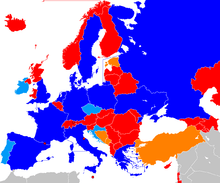
Qualified — directly
Qualified — after Play offs
Did not qualify — Play offs
Did not qualify — First Round
Did not enter
Not a UEFA member
| Country | Qualified as | Date qualification was secured | Previous appearances in tournament1 2 |
 Poland Poland | Co-hosts | 000000002007-04-18-000018 April 2007 | 1 (2008) |
 Ukraine Ukraine | Co-hostsA | 000000002007-04-18-000018 April 2007A | 0 (debut) |
 Germany3 Germany3 | Group A winner | 000000002011-09-02-00002 September 2011 | A10 (1972, 1976, 1980, 1984, 1988, 1992, 1996, 2000, 2004, 2008) |
 Russia4 Russia4 | Group B winner | 000000002011-10-11-000011 October 2011 | 9 (1960, 1964, 1968, 1972, 1988, 1992, 1996, 2004, 2008) |
 Italy Italy | Group C winner | 000000002011-09-06-00006 September 2011 | 7 (1968, 1980, 1988, 1996, 2000, 2004, 2008) |
 France France | Group D winner | 000000002011-10-11-000011 October 2011A | 7A (1960, 1984, 1992, 1996, 2000, 2004, 2008) |
 Netherlands Netherlands | Group E winner | 000000002011-09-06-00006 September 2011A | 8 (1976, 1980, 1988, 1992, 1996, 2000, 2004, 2008) |
 Greece Greece | Group F winner | 000000002011-10-11-000011 October 2011B | 3 (1980, 2004, 2008) |
 England England | Group G winner | 000000002011-10-07-00007 October 2011 | 7B (1968, 1980, 1988, 1992, 1996, 2000, 2004) |
 Denmark Denmark | Group H winner | 000000002011-10-11-000011 October 2011C | 7C (1964, 1984, 1988, 1992, 1996, 2000, 2004) |
 Spain Spain | Group I winner | 000000002011-09-06-00006 September 2011B | 8A (1964, 1980, 1984, 1988, 1996, 2000, 2004, 2008) |
 Sweden Sweden | HBest runner-up | 000000002011-10-11-000011 October 2011D | 4 (1992, 2000, 2004, 2008) |
 Croatia Croatia | Play-off winner | 000000002011-11-15-000015 November 2011 | 3A (1996, 2004, 2008) |
 Czech Republic5 Czech Republic5 | Play-off winnerA | 000000002011-11-15-000015 November 2011A | 7D (1960, 1976, 1980, 1996, 2000, 2004, 2008) |
 Portugal Portugal | Play-off winnerB | 000000002011-11-15-000015 November 2011B | 5A (1984, 1996, 2000, 2004, 2008) |
 Republic of Ireland Republic of Ireland | Play-off winnerC | 000000002011-11-15-000015 November 2011C | 1A (1988) |
1 Bold indicates champion for that year
2 Italics indicate (co-)host for that year
Seedings
The pot allocations for the qualifying group stage draw were based on the UEFA national team coefficient rankings as of the end of 2009. The sole exception was the automatic placement of Spain, as reigning European champions, as the top-ranked team (their coefficient ranking would have also placed them in this position anyway).[2] Each nation's coefficient was generated by calculating:[3]
The 51 entrants were divided into the following six pots for the drawing of nine qualifying groups on 7 February 2010 in Warsaw, Poland:[4]
The countries which eventually qualified for the final tournament are emboldened in the table below.
- Notes
- The co-hosts Ukraine and Poland, which qualified automatically, were ranked 19th (28,133) and 23rd (26,620) respectively.
Before the draw UEFA confirmed that, for political reasons, Armenia would not be drawn against Azerbaijan (due to the dispute concerning territory of Nagorno-Karabakh) and Georgia would not be drawn against Russia (due to the dispute regarding the territory of South Ossetia).[5] Armenia and Azerbaijan were drawn together in Group A during the draw ceremony, forcing UEFA to reassign Armenia to Group B, as Azerbaijan had refused to play in Armenia when they had been drawn together during UEFA Euro 2008 qualifying.[6]
Tiebreakers
If two or more teams are equal on points on completion of the group matches, the following criteria are applied to determine the rankings.[7]
- higher number of points obtained in the group matches played among the teams in question;
- superior goal difference from the group matches played among the teams in question;
- higher number of goals scored in the group matches played among the teams in question;
- higher number of goals scored away from home in the group matches played among the teams in question;
- if, after applying criteria 1) to 4) to several teams, two or more teams still have an equal ranking, the criteria 1) to 4) will be reapplied to determine the ranking of these teams. If this procedure does not lead to a decision, criteria 6) to 10) apply;
- superior goal difference in all group matches;
- higher number of goals scored in all group matches;
- higher number of goals scored away from home in all group matches;
- fair play ranking in all group matches;
- drawing of lots.
Summary
Winner of each group and the best runner-up qualified directly for the
UEFA Euro 2012
Other teams were eliminated after the first round
Groups
The following 18 dates were reserved for group matches in qualifying:
- 3–4 and 7 September 2010
- 8–9 and 12 October 2010
- 25–26 and 29 March 2011
- 3–4 and 7 June 2011
- 2–3 and 6 September 2011
- 7–8 and 11 October 2011
For the first time, Tuesday evenings replaced Wednesday evenings for midweek qualifying fixtures where two matchdays occurred in the same week. This was in order to allow players an extra day to return to their clubs for domestic duty the following week. Consequently, teams were permitted to move the earlier weekend match forward to the Friday evening.
Group A
Group B
Group C
* The Italy v Serbia match was abandoned after six minutes due to rioting by Serbian fans.[8] The UEFA Control and Disciplinary Body awarded the match as a 3–0 forfeit win to Italy.[9]
Group D
Group E
Group F
Group G
Group H
Group I
Ranking of second-placed teams
The highest ranked second placed team from the groups qualified automatically for the tournament, while the remainder entered the play-offs. As some groups contain six teams and some five, matches against the sixth-placed team in each group were not included in this ranking. As a result, a total of eight matches played by each team count toward the purpose of the second-placed ranking table.
Tiebreakers
If two or more runners-up had an equal number of points from their eight matches contributing toward the ranking, then the following criteria were applied:
- Superior goal difference from these matches
- Higher number of goals scored in these matches
- Higher number of away goals scored in these matches
- Position in the UEFA national team coefficient ranking system
- Fair play ranking in these matches
- Drawing of lots
Final standings
| Legend |
| Qualified for the UEFA Euro 2012 finals |
| Advanced to the qualifying play-offs |
Play-offs
The play-off ties were played over two legs, with the first legs on 11 November and the second legs on 15 November 2011. The four winners are found according to the standard rules for the knockout phase in European competitions, and the winners qualified for the Euro 2012 tournament.
Seedings
The draw for the play-offs was held on 13 October 2011 in Kraków, Poland, to determine the four pairings as well as the order of the home and away ties.[10]
After the controversy caused by the UEFA play-offs during 2010 FIFA World Cup qualifying – which was widely assumed to be an unseeded draw and then later seeded by FIFA – UEFA stated from the outset that the draw for the play-offs would be seeded.[7] The four runners-up with the best positions in the UEFA team coefficient ranking system were therefore seeded.
Each nation's coefficient was generated by calculating:[11]
The seedings were as follows:[12]
Matches
Team 1 was home team in the first game, and guest team in the second game.
Top goalscorers
There were 636 goals scored by 339 different players and 17 own goals.[13] This list reflects the top 15 players or those tied in the top 15.
- 12 goals
- 9 goals
- 7 goals
- 6 goals
- 5 goals
Attendances
Data compiled from soccerway.com.
| Host team |
Highest |
Lowest |
Total |
Average |
 Albania Albania | 15,600 | 3,000 | 56,646 | 11,329 |
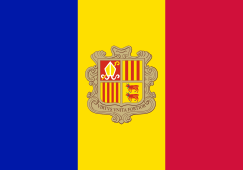 Andorra Andorra | 1,100 | 550 | 4,110 | 822 |
 Armenia Armenia | 14,403 | 8,500 | 57,903 | 11,581 |
 Austria Austria | 47,500 | 22,500 | 189,000 | 37,800 |
 Azerbaijan Azerbaijan | 29,858 | 6,000 | 83,770 | 16,754 |
.svg.png) Belarus Belarus | 28,500 | 7,000 | 97,854 | 19,571 |
.svg.png) Belgium Belgium | 44,185 | 24,231 | 174,285 | 34,857 |
 Bosnia and Herzegovina Bosnia and Herzegovina | 28,000 | 9,000 | 74,000 | 14,800 |
 Bulgaria Bulgaria | 27,230 | 1,672 | 47,972 | 11,993 |
 Croatia Croatia | 28,000 | 8,370 | 83,457 | 16,691 |
 Cyprus Cyprus | 15,444 | 2,088 | 27,588 | 6,897 |
 Czech Republic Czech Republic | 17,873 | 6,600 | 51,433 | 12,858 |
 Denmark Denmark | 37,167 | 15,544 | 108,631 | 27,158 |
 England England | 84,459 | 73,426 | 308,464 | 77,116 |
 Estonia Estonia | 8,660 | 5,185 | 33,637 | 6,727 |
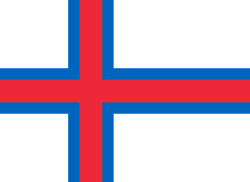 Faroe Islands Faroe Islands | 5,654 | 974 | 12,111 | 2,422 |
 Finland Finland | 23,257 | 8,192 | 80,617 | 16,123 |
 France France | 79,299 | 24,710 | 324,110 | 64,822 |
 Georgia Georgia | 54,500 | 7,824 | 160,746 | 32,149 |
 Germany Germany | 74,244 | 43,751 | 267,640 | 53,528 |
 Greece Greece | 27,200 | 13,520 | 87,195 | 17,439 |
 Hungary Hungary | 25,169 | 9,209 | 93,091 | 18,618 |
 Iceland Iceland | 9,767 | 5,267 | 28,800 | 7,200 |
 Israel Israel | 33,421 | 10,801 | 88,403 | 17,681 |
 Italy Italy | 19,480 | 18,000 | 76,180 | 19,045 |
 Kazakhstan Kazakhstan | 18,000 | 8,500 | 63,300 | 12,660 |
 Latvia Latvia | 7,600 | 4,315 | 27,807 | 5,561 |
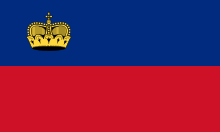 Liechtenstein Liechtenstein | 6,100 | 1,886 | 16,177 | 4,044 |
 Lithuania Lithuania | 9,180 | 3,500 | 21,928 | 5,482 |
 Luxembourg Luxembourg | 8,052 | 1,857 | 22,180 | 4,436 |
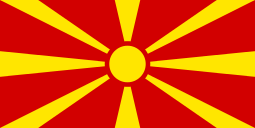 Macedonia Macedonia | 29,500 | 4,100 | 58,100 | 11,620 |
 Malta Malta | 10,605 | 2,614 | 30,624 | 6,125 |
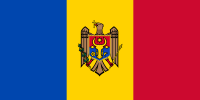 Moldova Moldova | 10,500 | 6,534 | 48,334 | 9,667 |
 Montenegro Montenegro | 11,500 | 7,442 | 41,032 | 10,258 |
 Netherlands Netherlands | 51,700 | 25,000 | 204,926 | 40,985 |
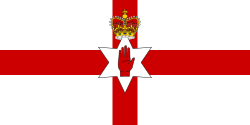 Northern Ireland Northern Ireland | 15,200 | 12,604 | 70,335 | 14,067 |
 Norway Norway | 24,828 | 13,490 | 85,234 | 21,309 |
 Portugal Portugal | 47,829 | 9,100 | 119,761 | 29,940 |
 Republic of Ireland Republic of Ireland | 51,650 | 33,200 | 256,029 | 42,915 |
 Romania Romania | 49,137 | 8,200 | 113,723 | 22,745 |
 Russia Russia | 49,515 | 18,000 | 164,385 | 32,877 |
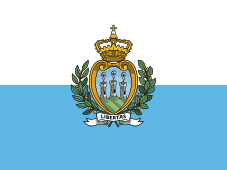 San Marino San Marino | 4,127 | 714 | 10,920 | 2,184 |
 Scotland Scotland | 51,564 | 34,071 | 174,007 | 43,502 |
 Serbia Serbia | 35,000 | 350 | 78,878 | 15,776 |
 Slovakia Slovakia | 10,892 | 4,300 | 38,497 | 7,699 |
 Slovenia Slovenia | 15,790 | 9,848 | 68,868 | 13,774 |
 Spain Spain | 27,559 | 15,660 | 76,320 | 19,080 |
 Sweden Sweden | 33,066 | 21,083 | 144,125 | 28,825 |
 Switzerland Switzerland | 37,500 | 16,880 | 100,377 | 25,094 |
 Turkey Turkey | 49,532 | 32,174 | 213,420 | 42,684 |
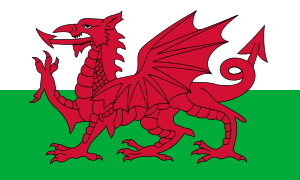 Wales Wales | 68,959 | 8,194 | 103,531 | 25,883 |
References
External links
|
|---|
|
| Stages | |
|---|
|
| General information | |
|---|
|
| Official symbols | |
|---|
|
|---|
|
| Tournaments | |
|---|
|
| Qualifying | |
|---|
|
| Finals | |
|---|
|
| Squads | |
|---|
|
| Bids | |
|---|
|
| Tournament statistics | |
|---|
|
| Broadcasting rights | |
|---|
|
| Records and lists | |
|---|
|
| Miscellaneous | |
|---|

.jpg)